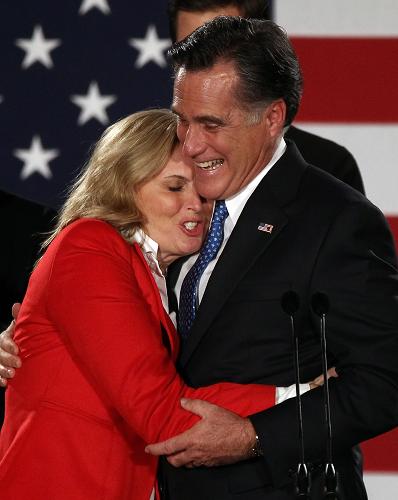Romney wins Iowa, but with continued resistance
 0 Comment(s)
0 Comment(s) Print
Print E-mail
Xinhua, January 5, 2012
E-mail
Xinhua, January 5, 2012
Republican presidential candidate Mitt Romney claimed victory at the Iowa caucus late Tuesday night, but his failure to capture a decisive majority vote shows a lingering resistance from many Republicans who have repeatedly looked for someone - almost anyone - else.
The exceedingly close caucus results set up an uncertain timetable for determining the Republican presidential nominee, as with only 24.6 percent of the vote Romney was not clearly illuminated in Iowa as the Republican favorite.
Highlighting important divisions within the Republican Party, over three-quarters of Iowa Republicans still favored someone else, and may indicate that Romney's nomination battle could drag on longer than his campaign would like.
Despite his position as default frontrunner, outside his familiar Northeastern territory Romney struggles to capture a strong majority of support. Since he announced his candidacy in June, Romney has rarely posted more than 25 percent in national polls.
But it seems Republicans are not as much bothered by the bleak picture for Romney as by seeing alternative Republican frontrunners fizzling out one after another.
This so-called "anybody but Romney" phenomenon seems to primarily be driven by traditional Republican stalwarts such as Newt Gingrich - who derisively refers to Romney as a "Massachusetts moderate" and doubts if he is conservative enough to represent the Republican party - and the social conservatives and religious interest groups who distrust Romney's switched positions on abortion and other social issues.
As Gingrich placed a distant fourth in Iowa with 13.3 percent of the vote, the rise of Rick Santorum on the backs of evangelicals may be the last legitimate attempt to keep Romney from capturing the Republican nomination, and shows that the "last stand" may be fought primarily by the social conservatives who are still overwhelmingly hesitant to take his side.
Emboldened by recent endorsements from Christian evangelical leaders and an ensuing surge in the polls, former senator Santorum exceeded the expectations of many in Iowa and took 30,007 votes or 24.5 percent, a mere 8 votes shy of Romney' s winning total.
As historically one of the core support bases of the Republican Party, the evangelical vote is crucial to a strong Republican showing in the general election, and in perhaps the most significant statistic from the Iowa contest, only 14 percent of Christian evangelicals voted for Romney.
About 32 percent of evangelicals voted for Santorum in Iowa, and a combined 19 percent cast ballots for Santorum's social conservative competitors Rick Perry and Michele Bachmann.
With Bachmann dropping out of the presidential race Wednesday and the Perry campaign placing a dismal fifth in the caucus, analysts feel many of these candidates' votes could now go to Santorum, as social conservatives scramble to unite around their last "anybody but Romney" option.
As a united evangelical voting bloc could give Santorum a sizeable push, the preferences of this social interest group could be important for the Romney campaign to consider in the future.
Fortunately for Romney, next week's New Hampshire primary looks promising for a more decisive victory, as the latest Suffolk Tracking poll Tuesday currently has the former Massachusetts governor at 43 percent there.
If Romney holds on to New Hampshire, it could possibly give him momentum for the following South Carolina and Florida primaries at the end of January, possibly giving him the nomination by spring.
But as Iowa demonstrates, the fact remains that despite being referred to by many political analysts as the "default" Republican nominee - and the only candidate actually engaged by the Obama administration as a potential challenger - traditional Republican interest groups like Christian evangelicals and social conservatives continue to resist Romney, instead rallying around candidates like Santorum as long as they possibly can.
It is still unclear just how effectively Santorum and the rest of the Romney resistance will be able to organize in upcoming elections and hold out under pressure, as well as if their extremely conservative views could possibly be shared by the majority of voters.
Nonetheless, with millions of U.S. dollars in campaign fundraising, Romney is in a strong position to wait as long as the Republican nominating convention in August for the nod if he has to.
What is perhaps more important for Romney is just how politically damaged by fellow Republicans he could be at the end of the nomination process while President Obama comfortably watches, and if the evangelical Christians and social interest groups resisting Romney now will show up to vote for him on Election Day in November.







Go to Forum >>0 Comment(s)